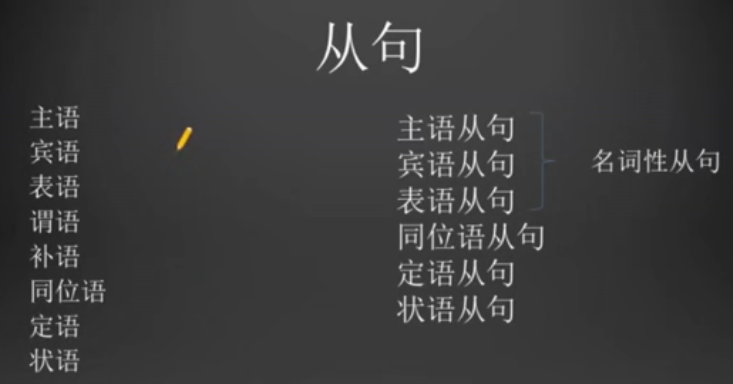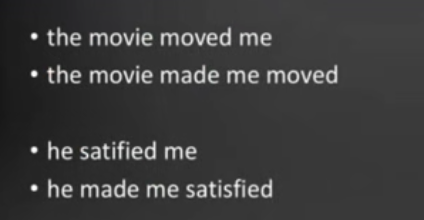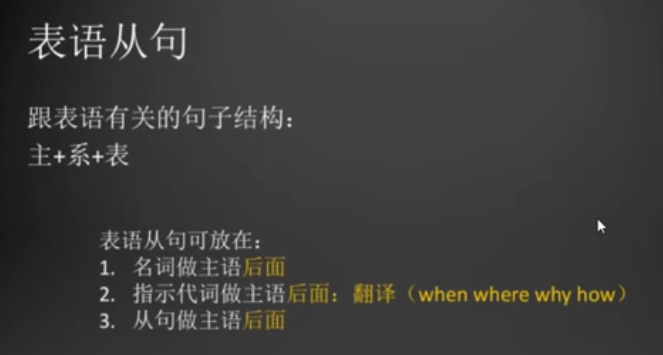1 从句的类型
我们之前讲过句子成分有8种,其中“谓语,补语”不能用句子替代,其余6种均可,所以从句类型有6种,3种称为名词性从句,如下图所示:

注:从句永远是一个完整的句子!!!
2 名词性从句的共同特点

注:陈述语气:如果句子是陈述句,不需要做任何改动;如果句子是疑问句,要将时表词与主语换个位置!
3 主语从句
关于主语从句,有4点需要说明:
(1)后面的动词一般是使动词(前边讲过)或者make。
举例:
- 他经常半夜给我打电话让我很恼火---that he calls me at midnight annoys me.(使动词)
- 他来不来没有什么差别---whether he will come makes no difference.(make)
(2)所有的使动词都可以变成make的形式,但是只有形容词的时候,只能用make。

在举一个只能使用make的例子:
- 他说的话让我很生气---what he said made me angry.
(3)主语从句中从句是一般疑问句时,不能使用if,只能使用wether。
(4)主语从句中的谓语动词使用单数。
4 宾语从句
关于宾语从句,有8点需要说明:
(1)宾语从句的位置

(2)宾语从句的时态

注:只有宾语从句有这个要求,即“主句是过去时态,从句必须是过去的某种时态”!
(3)宾语从句是一般疑问句时
- whether 后可接or not,if不能。
- whether后可接to do,if 不能。
- 当动词后有介词时(不及物动词),只能使用whether。
其他的情况,if与whether都可以使用。
(4)当谓语是“think,believe”,且表示否定的时候,否定前移。
举例:
- 我认为他不是个乐观的人---i do not think that he is an optimistic person.
(5)当谓语是“think,believe”时,有疑问词前移的现象。
举例:你觉得他会去哪了呢?
- 你可能会这样写:do you think where he went.
- 实际上应:where do you think he went.
(6)常用的一般过去时表达
- 我就知道---i knew
- 我没有想到---i did not expect
- 我还以为---i thought
- 我从来没有怀疑过---i never doubted
- 我还担心---i was worried
举个例子:
- 我没有想到你能来---i did not expect that you could come.
(7)疑问词可以连接to do
使用的话,需要满足一下两点:
- 从句与主句的主语是一样的。
- 这个事情还没有发生。
举例1:我不知道怎么告诉他这件事。
- 第一反应:i do not know how i should tell him the thing.
- 也可以这样:i do not know how to tell him the thing.
注:上述两种表述都是正确的!
举例2:
- 我不知道找谁---i do not know who to look for.
举例3:
- 我们不知道去哪---we do not know where to go.
(8)主+谓+宾+宾补
举例:我觉得他能来是好事。
- i think that he can come a good thing.
有时候宾语过长,可以it代替:
- i think it a good thing that he can come.
注:这种用法不多,谓语动词一般都是“think,believe”。
5 表语从句
关于表语从句,有三点需要说明:
(1)跟表语有关的句子结构
表语前边大部分是be动词,be动词前边的主语有三种类型,如下:

关于第2点“指示代词放在主语后边”需要注意翻译。举例体会,如下:
- 他就是因为这个离开的---this is why he left.
- 他们就是在哪个时候结婚的---that is when they got married.
- 我们就是这么认识的---this is how we met.
关于第3点“从句做主语后面”,其实就是“主语从句+表语从句”,这种表述方式与宾语从句的表示意思相同,只是“主语从句+表语从句”这种表述有强调的作用。举例体会,如下:
我的意思是他是个好人(下边两种不同的表达方式)
- i mean that he is a good person.(宾语从句)
- what i mean is that he is a good person.(主语从句+表语从句)
(2)what的用法
 举例:
举例:
what在句子中做主语成分,且带动词:
- 让我惊讶的是他通过了考试---what surprised me is that he passed the exam.
what在句子中做主语成分,且不带动词:
- 奇怪的是他们什么都没有说就走了---what is strange is that he left without saying anything.
what在句子中不做主语成分,且带动词:
- 我所知道的是他们需要我们的帮助---what i know is that they need our help.
what在句子中不做主语成分,且不带动词:
- 我好奇的是他们会不会像他们所说的帮助我们---what i am curious about is that they help us like they said.
(3)表语从句的特殊之处
与“主语从句,宾语从句”相比,表语从句多了3个疑问词,分别是because/as if (好像)/as(像) 。
举例1:
- 那是因为他不相信我---that is because he does not believe me.
注:上边的句子与“that is why he does not believe me.”的区别是:上边的句子表示原因,翻译为“那是因为他不相信我”;后边这个句子表示结果,翻译为“那就是他为什么不相信我”(因为之前...导致不相信我)。
举例2:
他看起来像一个艺术家。
- he looks as if he were an artist(虚拟语气)--实际上不是不是艺术家
- he looks as if he is an artist(表语从句)---表语从句,有可能是艺术家
举例3:
- 并不是你看到的那样---it is not as you saw(as引导的表语从句)=it is not like what you saw.(like这里做介词,后边可接句子)